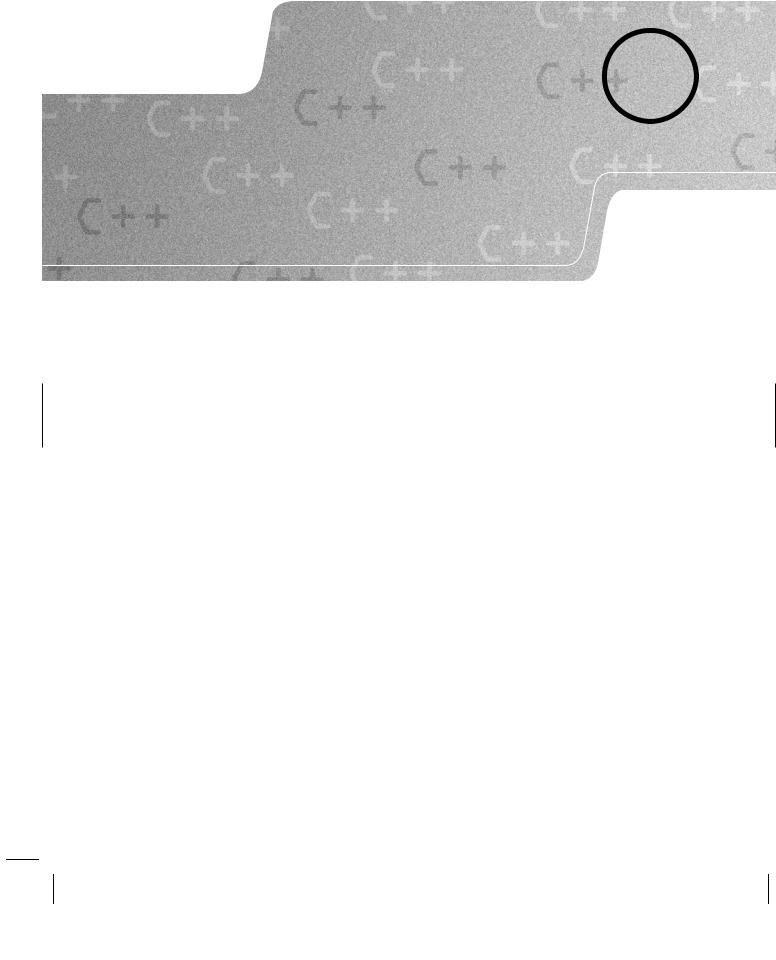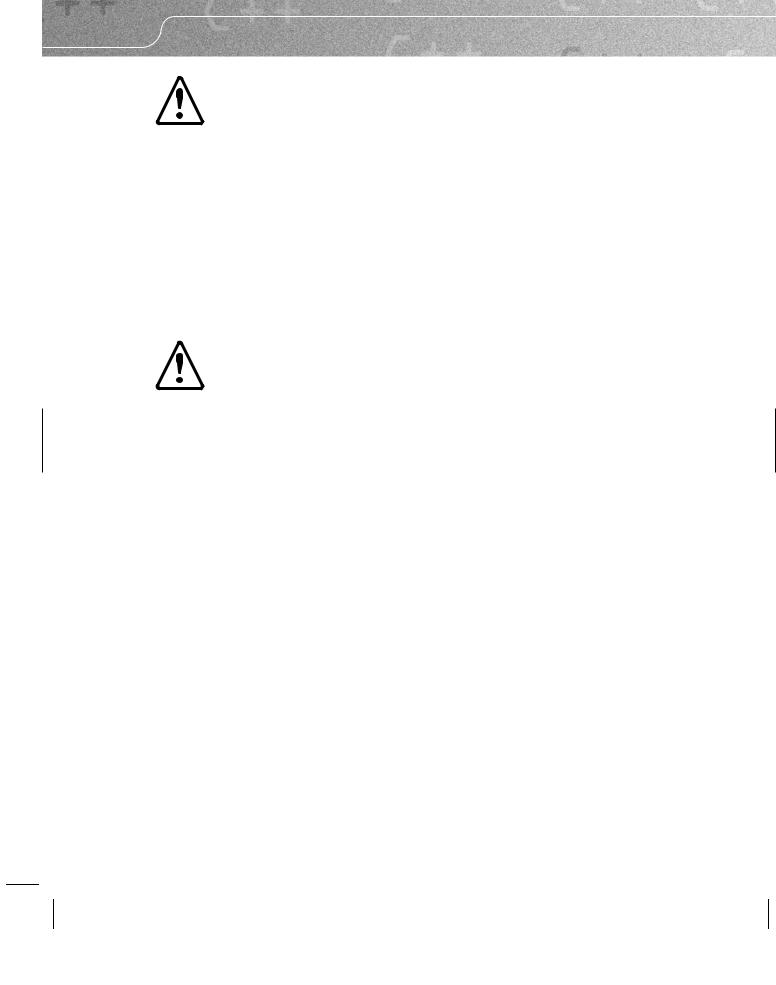
You Can Program In C++ (2006) [eng]
.pdf
108 |
CHAPTER 5 |
Default Arguments
Instead of using function overloading and delegation (as in the example above) it is sometimes convenient to provide a default value for the argument of one or more of the right-hand parameters in a function declaration. Such arguments are provided by appending an equals sign followed by the desired default to the parameter (after the name if one is provided). Once a parameter is provided with a default argument, all the subsequent parameters must also have default arguments. Once a default argument is used by a caller (by omitting an explicit argument in the call) no further explicit arguments can be provided.
Consider:
void drawline(fgw::playpen &, point start, point end, fgw::hue = black);
This declaration has substantially the same effect as the first of the specialized versions above. Indeed, they are so similar that the compiler will not allow the two declarations to co-exist.
However, the declaration
void drawline(fgw::playpen &, point start = point(0, 0), point end, fgw::hue);
is not allowed, because we are not allowed to provide default arguments for parameters unless we provide defaults for all the subsequent parameters.
Unnamed Parameters
In some cases, a parameter that has been included in a function declaration has no practical use in the specific definition provided for some special context. C++ specifies that it is not an error for a parameter to remain unnamed in the definition of a function. In addition, implementers are strongly encouraged to refrain from issuing any form of diagnostic if a parameter is unnamed in a function definition.
This feature of C++ is useful because it allows user code to be more portable. Libraries can be tailored to the needs of specific platforms, and data that has no use on a platform (though provided by users because it would be useful on other platforms) can be silently ignored.
inline
The superficial use of this keyword in C++ is to encourage the compiler to substitute the function’s definition for calls to the function. The motive for allowing programmers to make this request is to stop the performance enthusiasts from fretting about the many small functions that C++ encourages.
In practice, the valuable feature of defining a function with an explicit inline qualification is that the program is then allowed to contain multiple identical definitions of a function. If the linker finds that a function is redefined because of its appearance in different source-code files, it is required to issue a redefinition error. That requirement is switched off if all the definitions are qualified as inline.
In general, there is a tendency for new programmers to overuse inline. Modern compilers and linkers can cooperate to do a good job even without programmers hinting that they want the definition of a function to be used inline.

C H A P T E R 6
Behavior, Sequence
Points, and Order
of Evaluation
This is a short chapter but an important one. It covers a group of related topics that are essential for correct use of C++ for writing robust and reliable programs. There is no reference section because the whole chapter acts as both a reference and a tutorial. However, this chapter concludes with a set of guidelines to help you avoid most of the pitfalls that sequence points and order of evaluation can cause. The guidelines are sufficient for practical purposes, but the rest of the chapter gives you the necessary basics if you wish to understand the guidelines, or wish to ignore them at times.
Those writing C++ for others to use need to be familiar with this material. There are no exercises because the topics do not readily lend themselves to practice. The ‘Try This’ items are only to help you check on those aspects that are checkable rather than being unpredictable.
Types of Behavior
C++ classifies the expected behavior for source code into four categories: fully defined, implementationdefined, undefined, and unspecified.
Fully Defined Behavior
This is behavior that is completely specified by the C++ Standard; a compiler that does not compile source code with fully defined behavior to do what the C++ Standard says it should do is, at best, buggy. For example, the C++ Standard requires that the following source code compile and result in a program whose output is 2:
#include <iostream> #include <istream>
int main( ){
std::cout << 2 * sizeof('a');
}
Note that we need the #include <istream> because the Standard does not specify (though many experts thinks it should have) that <iostream> provide the full behavior for input and output objects. The

110 |
CHAPTER 6 |
Standard simply requires that <iostream> declare the names cout, cerr, clog, cin, wcout, wcerr, wclog, and wcin in namespace std. Most implementations include <istream> and <ostream> in <iostream>. Though the Standard allows this, it does not require it.
I chose the above example because the equivalent C program
#include <stdio.h>
int main( ){
printf("%d", 2 * sizeof('a'));
}
has an identical requirement if compiled with a C++ compiler, but a different one if compiled by an old C compiler. The first issue is that C++ specifies the behavior of a program whose main( ) function lacks a return statement (as being equivalent to return 0; at the point where there is no more code to execute). C did not, and so the lack of a return statement would be an error in old C. The most recent version of C (often called C99 to distinguish it from the still widely used version standardized in 1989/90 and corrected in 1994) has the same behavior as C++: falling off the end of main is equivalent to return 0;.
The second issue is that in C the type of a literal character is int, not char. The size of an int is implementation-defined and on most systems is either 2 or 4. However, the following variation of the above code is required to output 2 regardless of whether you use a C or C++ compiler.
#include <stdio.h>
int main( ){
printf("%d", 2 * sizeof(char)); return 0;
}
That is because sizeof char is defined as 1 by both the C and C++ Standards; a char occupies the smallest amount of memory that either language allows to be directly addressed.
Implementation-Defined Behavior
This is behavior that is allowed to vary from one implementation to another, but the implementer is required to document the details. We had an example of this above: the ratio of the amount of memory used by an int object to that used by a char object is implementation-defined. In other words, the output resulting from
std::cout << sizeof(int);
is implementation-defined.
Another example of implementation-defined behavior is whether a plain char behaves like a small, signed integer (i.e. signed char) or a small, unsigned integer (unsigned char). Many compilers allow the programmer to choose which behavior they want for char.
T R Y T H I S
Try the following code with the compiler and IDE you are using to discover which form of char it is providing in the configuration you are using.

BEHAVIOR, SEQUENCE POINTS, AND ORDER OF EVALUATION |
111 |
#include <iostream>
int main( ){ char c(-1);
if(c < 200) std::cout << "signed \n"; else std::cout << "unsigned \n"; return 0;
}
I have not bothered with exception-handling because this is a tiny program to be used once and thrown away. How we initialize c with -1 depends on whether char is treated as a signed or unsigned integer type. If char is a signed type then -1 is stored as is (in whatever way the system represents negative one – exactly how depends on whether signed integers are represented in two’s complement, one’s complement or sign and magnitude). If char is being treated as an unsigned type, -1 will wrap around to the largest value available for a char. Note that for any unsigned representation of char the largest possible value is certainly larger than 200.
Unspecified Behavior
This covers cases where the compiler is free to select any one of a number of reasonable actions, and the implementer is not required to document which one the compiler will select. This is usually because all the possible choices will usually have identical results. However, it is often possible to construct code that will behave differently according to the choice the compiler makes.
An example of unspecified behavior is that C++ (unlike some other languages such as Java) does not specify the order of evaluation of subexpressions that are parts of a larger expression. Look at the following source code:
#include <iostream>
int global(0);
int add1_to_global( ){ return ++global;
}
int add2_to_global( ){ return (global += 2);
}
int main( ){
std::cout << add1_to_global( ) + add2_to_global( ) << '\n';
}
The C++ Standard requires that the calls of add1 to global( ) and add2 to global( ) be done sequentially (i.e. it cannot send the two calls to different CPUs in parallel), but it does not specify which will be evaluated first. In this case, the result will depend on which choice the compiler makes. If it makes the two function calls in a left-to-right order the result will be 4, but if it calls them in reverse order the result will be 5. Whichever order it chooses, the final value stored in global will be 3.
Because the order of evaluation of subexpressions (in this case two function calls) is unspecified by the C++ Standard, both 4 and 5 are correct output for the above program. In fact, the compiler you are using (assuming it is the same version that I have) will produce a program whose output is 5. That tells me that the compiler is creating code that calls add2 to global( ) before calling add1 to global( ).

112 |
CHAPTER 6 |
WARNING!
If you did not already know that global variables can cause serious problems, this example should demonstrate one of the reasons good programmers avoid them.
While C++ provides rules for the order in which operators are applied during the evaluation of an expression, it provides very few requirements for the order in which subexpressions are evaluated: a subexpression is evaluated before its value is needed by an operator. Many programmers miss the full implications of this rule. For example, using the above functions,
int main( ){
std::cout << add1_to_global( ) << add2_to_global( ) << '\n';
}
also has unspecified behavior. The output can be ‘13’ or ‘23’ depending on the order in which the two functions are called. Furthermore the order in which the subexpressions (function calls in this case) are evaluated can vary from one place to another.
WARNING!
It is unsafe to assume that subexpressions will be evaluated in any specific order. Running test code will not tell you anything more than the order in which the subexpressions were evaluated in the test code. If the order matters you must do something to enforce an order, such as evaluating the pieces in separate statements. For example,
int main( ){
std::cout << add1_to_global( ); std::cout << add2_to_global( ) << '\n';
}
must result in the output of ‘13’, because there is no liberty to reorder entire statements.
Undefined Behavior
This is the big problem and one that lurks in far too much code written by people who think they know what they are doing. Any time you do something for which the C++ Standard provides no requirements, you are in the land of undefined behavior. I often see programmers excuse themselves on the basis that they have tested the code and it does what they expected it to. That is the most vicious aspect of undefined behavior; it can hide for years because nothing triggers the problem. There are a number of classic examples of undefined behavior that can cause damage to real systems. For example, I once reprogrammed the EPROM on a very expensive graphics card with a program that effectively did this:
void NEVER_RUN_THIS(bool q){ char message[ ] = "No";
if(q) strcpy(message, "yes");
}
I have stripped out all the other code and named the function in a way that I hope will persuade even the most casual reader never to use it. C programmers will recognize what the code does, and it does the same in C++. In simple terms, it allocates enough local storage to store the text ‘No’ and then proceeds to try to write ‘yes’ in the same space. It will not fit so the last character overflows. On many systems, that overflow might not actually do damage. On the system I was using it wrote data on top of the return address for the

BEHAVIOR, SEQUENCE POINTS, AND ORDER OF EVALUATION |
113 |
function. As a result, the function did not return to the caller but returned somewhere else. It was just my bad luck that the place it returned to was executable code that did the damage. Of course, modern operating systems will often spot such wild behavior and simply kick the program off. But:
WARNING!
A programmer must not rely on an operating system to intervene to protect itself and other programs from abuse caused by code with undefined behavior. A program that includes undefined behavior is an accident waiting to happen.
Sequence Points
Sequence points are islands of stability in a C++ program where we can be certain that some actions are completed and that other actions will not have started. All computer languages implicitly have such points, but in C++ (as in C) they are made explicit by the Standard, and good programming requires either strict adherence to a set of guidelines or a good deal of understanding of what can happen between sequence points.
Most of a program consists of evaluating expressions. The evaluation of an expression results in a value. In addition, many expressions also have side effects. The more obvious side effects are such things as opening and closing files, extracting data from files, inserting data into files, and other forms of input and output.
One of the more insidious side effects is that of changing the state of the program itself. By that, I mean writing something to the program’s memory. The most obvious example of this is the use of assignment to store a result. It comes as a surprise to many programmers that this process of storing a result is far from being a universally good thing. Those whose prior experience of programming has been with functional languages such as Haskell may even have learned that assignment is a dangerous and highly suspect operation.
A C++ statement such as
i = j * k;
consists of two distinct elements. The first is the evaluation of the expression i = j * k. We almost always throw away the result, but nonetheless there is a result that can be used in some circumstances. For example,
int foo(int & result, int lhs, int rhs){ return result = lhs * rhs;
}
returns the value of the expression result = lhs * rhs. In general, we are usually more interested in the fact that evaluating an assignment expression results in storing a value in the object designated by the left-hand operand of the assignment operator. The function foo( ) does two things. It returns a value, but it also has the side effect of storing the result of evaluating lhs * rhs in the object designated by result. Notice how this is different from:
int bar(int lhs, int rhs){ return lhs * rhs;
}
The function bar( ) has no side effects; it works out and returns the result of lhs * rhs. In computer-science terms bar( ) is a pure function, because calling it has no permanent effects on either external objects such as printers, or on the program’s internal resources such as memory.
One problem with side effects is deciding when they happen. Storing results in memory is a relatively slow process on most machines. In addition, some hardware requires a stabilization time after a memory write before the program accesses that memory again. The solution that C++ uses (one inherited from C) is to

114 |
CHAPTER 6 |
specify something called a sequence point, where, if necessary, the program must wait while memory stabilizes. That is one of the motives for the concept of a sequence point; however, as programmers, we are more concerned with the practical implications.
Between two sequence points, we are free to read any memory representing objects as often as we like, providing that we do not write to any of that memory. However, if we write to a piece of memory between sequence points, we must only write to it once. Furthermore, we must only read that memory as part of the process of determining what the program will write to it. Breaking either of those rules results in undefined behavior.
Most programmers are happy with the first part of the rule: only write once to a piece of memory between sequence points. Many do not understand the second restriction. That restriction ensures that if memory is both read and written between sequence points then the read will have been completed before the write starts. In the context of C++’s unspecified order of evaluation of subexpressions, that is the only rule that could ensure safety.
Now you can see why it is important to know where the sequence points are in your code. Here is a complete list:
full expression: There is a sequence point at the end of evaluating a full expression. A full expression is one whose value is not directly used as part of evaluating some other expression. For example, in the function bar( ) above, lhs * rhs is a full expression; however, in the function foo( ), lhs * rhs is not a full expression, because the result is used in evaluating the assignment to result.
Note that a single statement can involve more than one full expression. For example, the statement
if(a < b) i++;
contains two full expressions: a < b and i++.
function call: Two sequence points protect a function call. There is a sequence point immediately after the evaluation of all the arguments, so the body of the function can proceed on the assumption that all the side effects of initializing the parameters are complete. There is a second sequence point at the point of return, which ensures that any side effects of providing the return value are complete before the code that called the function resumes.
Few programmers write code that has a problem with the return sequence point, but the entry one is sometimes misunderstood. For example,
int bar(int lhs, int rhs); int main( ){
int i(0);
std::cout << bar(i, i++);
}
may seem fine until you examine the call of bar( ) more carefully. Two expressions, i and i++, have to be evaluated in order to call bar( ). Those expressions are not full expressions, because the results will be used as arguments to initialize the parameters of bar( ). That means that there is no sequence point between the evaluation of i and i++. However, evaluating the first of those requires that the value stored in the object designated by i be read, but not for determining what will be written to it as a side effect of incrementing it during the process of evaluating the second argument. In other words, we have broken the rules about reading and writing to the same object between sequence points. That means that we are in the realms of undefined behavior and anything can happen. In practice, the usual manifestation of the problem is that the two orders of evaluation result in different values for the first argument. That should not lull you into a false sense of security: this is not unspecified behavior but undefined behavior. Please learn the difference, because one day it will matter.
comma operator: A comma (,) is, in some contexts, simply punctuation that separates a list of items. In other contexts, it is the C++ sequence operator. Knowing which is which is largely a matter of experience.

BEHAVIOR, SEQUENCE POINTS, AND ORDER OF EVALUATION |
115 |
Unfortunately, which it is can have a profound effect on your program. When a comma is a sequence operator it injects a sequence point into the code, which means that the expression to the left of the comma is fully evaluated and all side effects complete before the expression on the right is touched.
Even worse, C++ allows programmers to redefine the comma operator if at least one of its operands has a user-defined type. In those circumstances, it is no longer a sequence operator, and the left and right operands (expressions) can be evaluated in either order. The upshot is that it is probably better to assume that a comma is not a sequence operator unless you definitely know that it is.
conditional operator: There is a sequence point between the evaluation of the left-hand operand of the conditional operator and the evaluation of whichever of the other two operands is selected. So
int bar(int value){
value ? value++ : value--;
...
return value;
}
is fine in so far as the first statement is concerned. I cannot imagine why I might write such a statement but there is no undefined behavior. The first read of value is protected from the later write to the same storage by a sequence point at the ?.
the || and && operators: There is a sequence point after the evaluation of the left-hand operand (expression) for the built-in versions of each of these operators. That means that the left-hand operand is fully evaluated and all consequential side effects completed before the right-hand operand is evaluated. Note that the right-hand operand is only evaluated if necessary to determine the result. That means that any side effects of evaluating the right-hand operand are conditional on the value of the left-hand operand.
Multiple Sequence Points
Expressions often contain multiple sequence points, and a programmer must be careful not to assume that sequence points force an order of evaluation. The sequence (comma) operator, the conditional operator, and the || and && operators force an order of evaluation on their operands but that is as far as it goes. If you write
i = (expr1 || expr2) + (expr3 && expr4);
any evaluation sequence that fully evaluates (including side effects) expr1 before expr2 and expr3 before expr4 is within the rules. There is no requirement that, for example, expr1 be evaluated before expr4.
Order of Evaluation
There is not much more to say. Between sequence points, subexpressions can be evaluated in any order that is consistent with the associativity and precedence of the operators involved. Most importantly, parentheses do not change order of evaluation, only precedence. For example, the rules for operators require that in
double d;
d = expr1 / expr2 * expr3;
the division must be completed before the multiplication, and both those must be completed before the assignment to d. However, expr1, expr2, expr3, and the address of the object designated by d can be evaluated in any order. Adding some parentheses cannot change the latter allowance. So
double d;
d = expr1 / (expr2 * expr3);
forces execution of the multiplication to occur before the division but has no other impact.

116 |
CHAPTER 6 |
Guidelines
Note that the following guidelines give you a set of safe programming practices with regard to order of evaluation and sequence points. Ignoring a guideline is fine as long as you are willing to spend time checking that you have not introduced undefined behavior into your code. You should also check that any unspecified behavior would not result in erroneous results. In addition, you should document any implementation-defined behavior on which you are relying. For example, if your program relies on int using a 32-bit representation, that should be clearly documented.
Rule 1: Only use increment and decrement operators as full expressions. Do not have more than one assignment or compound assignment operator in a full expression.
If you follow this rule, you will not fall foul of the rule restricting reading and writing to the same storage between sequence points.
Rule 2: Avoid writing functions that modify a global object.
There are exceptions to this rule such as using std::cout, which is a global object (in namespace std), but even here you need some care. For example, consider:
#include <iostream>
int hello( ){
std::cout << "Hello "; return 1;
}
int world( ){
std::cout << "World "; return 2;
}
int main( ){
std::cout << hello( ) + world( ) << '\n';
}
Try that code. Then try replacing
std::cout << hello( ) + world( ) << '\n';
with
std::cout << hello( ) << world( ) << '\n';
or:
std::cout << hello( ), world( ) << '\n';
Do not try to explain the results because in the first two cases we have unspecified behavior. There are other orderings available to the compiler. In the third case the compiler must call hello( ) first and then call world( ) but there is something far stranger happening. The program first executes everything to the left of the comma. It then executes everything to the right of the comma. The latter only seems to work. Here is why. The expression world( ) << '\n' is evaluated as the value returned from world( ) shifted left by the number of places that '\n' represents as a number.

BEHAVIOR, SEQUENCE POINTS, AND ORDER OF EVALUATION |
117 |
Try changing the '\n' to "\n". In the first two cases it produces the same result, but in the third case you get a compile time error because "\n" is a string literal and cannot be converted into an integer value. Alternatively, try changing the return type of world( ) to double. Again, the first two examples compile and execute as before (though that is because the decimal indicator is suppressed for output of double values that are exact whole numbers). However, you again get a compile time error in the third case because the left-shift operator cannot be applied to a floating-point type.
Rule 3: Do not pass the same object to two functions by reference unless there is an intervening sequence point or both functions take the argument by const reference.
Remember that passing a reference (rather than a const reference) allows the function to change the object being referenced. If at least one of two function calls can change the object, the unspecified order of evaluation between sequence points means that there may be more than one possible result for your code. For example, consider:
int foo(int const & i){ return i;
}
int bar(int & i){ return i++;
}
int main( ){ int i(0);
std::cout << bar(i) << foo(i) << '\n';
}
If bar( ) is called first the output will be ‘01’, but if foo( ) is called first then it will be ‘00’. The sequence points in the function call and return only remove the potential for undefined behavior; they do not influence the order of evaluation of the various bits needed to execute the output statement.
Rule 4: Do not call functions with arguments provided by expressions unless you are certain that the order of evaluation of the arguments will not matter.
Remember that the comma used to separate arguments in a function call is just punctuation and is not a sequence operator.
